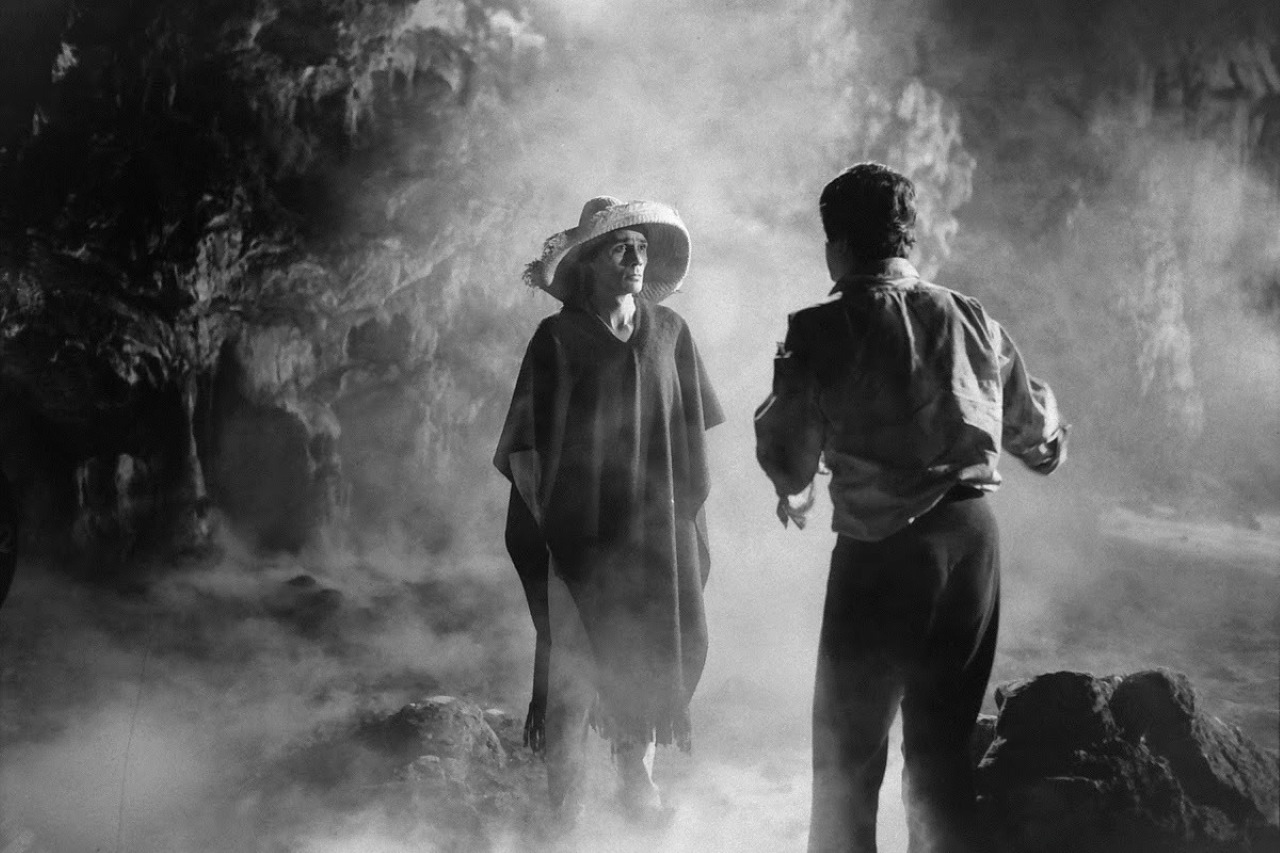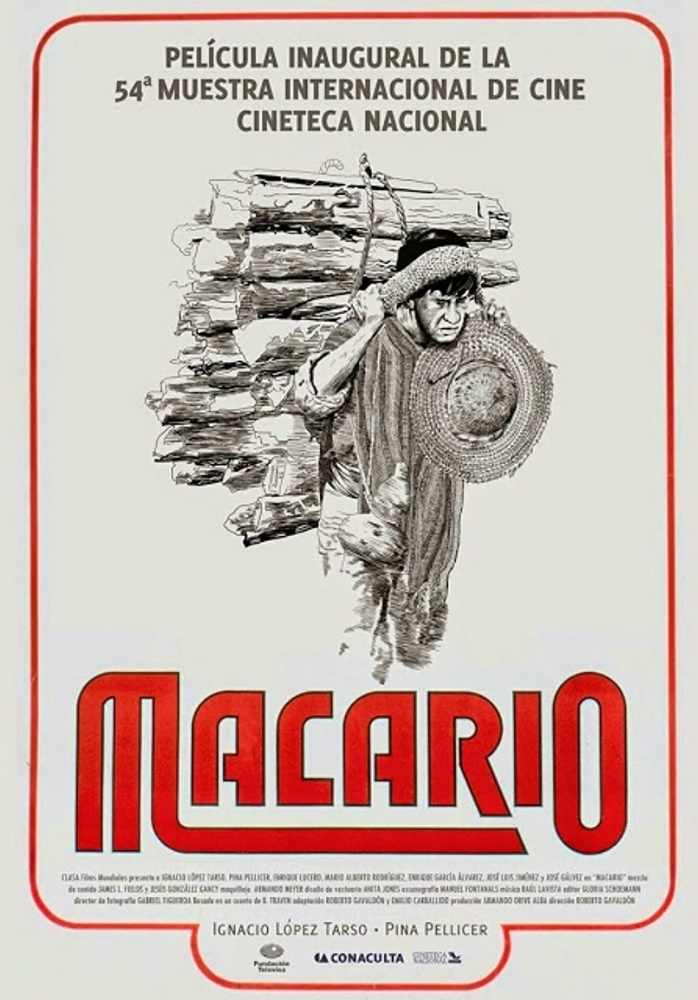Crew
Director – Roberto Gavaldon, Screenplay – Emilio Carballido & Roberto Gavaldon, Based on the Short Story The Third Guest (1950) by B. Traven, Producer – Armando Orive Alba, Photography (b&w) – Gabriel Figueroa, Music – Raul Lavista, Special Effects – Juan Muñoz Ravelo, Production Design – Manuel Fontanals. Production Company – Clasa Films Mundiales s.a..
Cast
Ignacio Lopez Tarso (Macario), Pina Pellicer (Macario’s Wife), Enrique Lucero (Death), Mario Alberto Rodriguez (Don Ramiro), Jose Galvez (The Devil), Jose Luis Jimenez (God), Eduardo Fajardo (Viceroy), Consuelo Frank (Viceroy’s Wife)
Plot
It is the Day of the Dead. Macario is a poor labourer who is constantly going hungry so that his five children can have enough to eat. Macario tells his wife he has had enough and swears he will not eat again until he can have an entire turkey for himself that he does not have to share with anybody else. His wife steals a turkey from the rich house where she delivers laundry and cooks it for Macario. He takes it into the forest to eat. There he is interrupted first by The Devil offering him riches in return for a share and then God, asking him to do a good deed and sacrifice some, but Macario refuses both. He then meets Death who asks for some and Macario agrees to share half, believing he is about to die. Death is so impressed by this display of friendship that he gives Macario a gift. He creates a spring and fills Macario’s gourd with its waters, telling Macario that the water can be used to heal and a single drop will be enough to restore a person to life. The stipulation is that if Macario sees Death standing at the end of the bed, he will know the person can be saved, but if Death is standing at the head, the person cannot be saved. Upon returning, Macario finds that his son has fallen into the well and is immediately required to use the magic water to heal him. Macario’s reputation grows around the town. After Macario heals his wife, the wealthy Don Ramiro capitalises on this and promotes Macario’s services as a healer. From this, they are finally able to buy a big house. However, The Inquisition then comes knocking at the door, seeking to try Macario as a sorcerer.
Macario is a fascinating work that was made to celebrate the Mexican Day of the Dead. It is adapted from The Third Guest (1950), a short story by B. Traven, a mysterious writer about whom little is known, not even his real name. He was probably a German national who lived in Mexico between the 1920s and 1960s. Traven’s most famous work was the novel The Treasure of Sierra Madre (1927), which was made into the famous Humphrey Bogart film in 1948. Macario was probably the most well-known film of Mexican director Roberto Gavaldon. It was even nominated for (although did not win) Best Foreign Language Film at the 1960 Academy Awards.
Macario is a fable of sorts – the simplicities it trades in are the ones you find in children’s film, particularly fairytales where impoverished peasantry is equated with pure-hearted virtue. There are times that you feel the film is laying on the hearts and flowers with a trowel – images of a mournfully long-suffering Macario at the dinner table as he must sacrifice his dinner for his children, looking on hungrily as succulent turkeys are placed in the baker’s oven for the wealthy landowner, his honest wife being accused of overcharging on her laundry. Ignacio Lopez Tarso’s performance is almost a silent one that seems like a single plaintive cry of “feed me” like an orphan in a Charles Dickens adaptation.
Roberto Gavaldon’s directorial style is dull and prosaic for the most part – more like the work for a 1940s US poverty row production or the quick styleless shooting schedules of a serial. That said, there are moments of undeniable imagination in the film – like Ignacio Lopez Tarso’s sinisterly surreal dream of dancing marionettes. There is also a fantastic scene later in the show where Death (Enrique Lucero) shows Ignacio Lopez Tarso a cave filled with lit candles that has been borrowed direct from Fritz Lang’s Destiny (1921). The film gets particularly fascinating when it comes to the various allegorical encounters between Macario and The Devil, God and finally Death (who comes dressed as peasant wearing a sombrero).

Macario turns out to be two different films. One is the allegorical morality play of a poor man who wants something for himself and encounters Death. Here the film plays out akin to The Seventh Seal (1957), which had Max Von Sydow stopping to play chess with Death, while here Ignacio Lopez Tarso offers to share food. The second half is quite a different story, also a morality play, where a poor man is granted a fantastical gift (water that can heal anybody) and how it makes him rich and then the subject of a witch-hunt by the religious elements of society.
The film reaches the predictable and downbeat conservative realisation of many films like this about fantastical gifts – that the receiver is better off without them and accepting their lot in life rather than desiring anything more than that. The film is not particularly well made on a technical level but it is the strength of the clear and simple morality story that carries it. A modern colour remake would work wonders.

